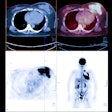Dear Molecular Imaging Insider,
Today's newsletter might be titled "Much ado about cancer," given the recent spate of research dealing with molecular imaging and its role in diagnosing and evaluating various forms of the disease.
In one recent study, an automated bone scan algorithm showed its value in assessing the response to radium-223 (Ra-223) treatment in patients with metastatic castration-resistant prostate cancer. Swedish researchers evaluated how well their automated Bone Scan Index (aBSI) software performed, which you can read about in this edition's Insider Exclusive.
In other news, Stanford University researchers assessed the use of three different criteria for interpreting gallium-68 (Ga-68) prostate-specific membrane antigen-11 (PSMA-11) PET with CT or MRI for prostate cancer to determine how to boost interreader agreement. All three approaches yielded "substantial to almost perfect" interrater and intrarater agreement for any cancer site on PET/MRI and PET/CT, with the exception of one criterion for judging distant metastases.
In addition, researchers from the University of California, Los Angeles are advocating a reconsideration of Ga-68 PSMA-11 PET/CT guidelines for detecting bone metastases in prostate cancer patients. They "surprisingly" found that approximately 18% of patients with serum prostate-specific antigen levels of less than 5 ng/mL had PSMA-positive lesions suspicious for bone metastases.
In the realm of neuroendocrine tumors, PET/CT performed better than planar scintigraphy or SPECT for determining which patients would most likely benefit from peptide receptor radionuclide therapy. Using a formula known as a Krenning score, researchers from the University of California, San Francisco found that Ga-68 DOTATATE PET/CT performed particularly well for lesions smaller than 2 cm.
Finally, when glioma results are inconclusive on MRI, clinicians should consider fluoroethyl-tyrosine (FET)-PET for more definitive results and to differentiate between tumor progression and treatment improvement. German and Dutch researchers found that FET-PET achieved sensitivity, specificity, and accuracy of 70% or greater and helped solve mysteries left by MRI.
Be sure to stay in touch with the Molecular Imaging Community on a daily basis for the latest research and news from around the world.




















